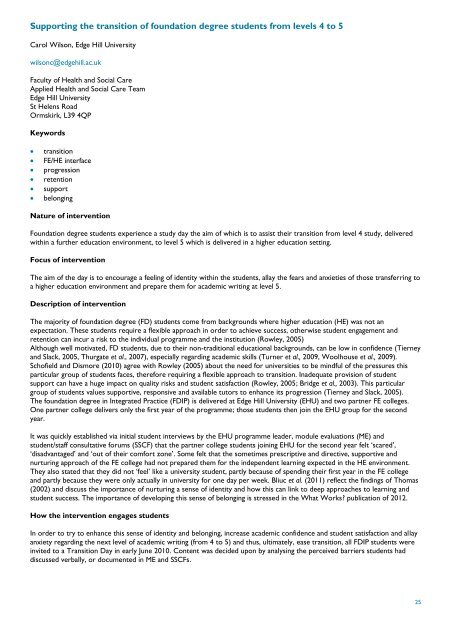Compendium of effective practice in higher education: Volume 2
Compendium of effective practice in higher education: Volume 2
Compendium of effective practice in higher education: Volume 2
Create successful ePaper yourself
Turn your PDF publications into a flip-book with our unique Google optimized e-Paper software.
Support<strong>in</strong>g the transition <strong>of</strong> foundation degree students from levels 4 to 5<br />
Carol Wilson, Edge Hill University<br />
wilsonc@edgehill.ac.uk<br />
Faculty <strong>of</strong> Health and Social Care<br />
Applied Health and Social Care Team<br />
Edge Hill University<br />
St Helens Road<br />
Ormskirk, L39 4QP<br />
Keywords<br />
<br />
<br />
<br />
<br />
<br />
<br />
transition<br />
FE/HE <strong>in</strong>terface<br />
progression<br />
retention<br />
support<br />
belong<strong>in</strong>g<br />
Nature <strong>of</strong> <strong>in</strong>tervention<br />
Foundation degree students experience a study day the aim <strong>of</strong> which is to assist their transition from level 4 study, delivered<br />
with<strong>in</strong> a further <strong>education</strong> environment, to level 5 which is delivered <strong>in</strong> a <strong>higher</strong> <strong>education</strong> sett<strong>in</strong>g.<br />
Focus <strong>of</strong> <strong>in</strong>tervention<br />
The aim <strong>of</strong> the day is to encourage a feel<strong>in</strong>g <strong>of</strong> identity with<strong>in</strong> the students, allay the fears and anxieties <strong>of</strong> those transferr<strong>in</strong>g to<br />
a <strong>higher</strong> <strong>education</strong> environment and prepare them for academic writ<strong>in</strong>g at level 5.<br />
Description <strong>of</strong> <strong>in</strong>tervention<br />
The majority <strong>of</strong> foundation degree (FD) students come from backgrounds where <strong>higher</strong> <strong>education</strong> (HE) was not an<br />
expectation. These students require a flexible approach <strong>in</strong> order to achieve success, otherwise student engagement and<br />
retention can <strong>in</strong>cur a risk to the <strong>in</strong>dividual programme and the <strong>in</strong>stitution (Rowley, 2005)<br />
Although well motivated, FD students, due to their non-traditional <strong>education</strong>al backgrounds, can be low <strong>in</strong> confidence (Tierney<br />
and Slack, 2005, Thurgate et al., 2007), especially regard<strong>in</strong>g academic skills (Turner et al., 2009, Woolhouse et al., 2009).<br />
Sch<strong>of</strong>ield and Dismore (2010) agree with Rowley (2005) about the need for universities to be m<strong>in</strong>dful <strong>of</strong> the pressures this<br />
particular group <strong>of</strong> students faces, therefore requir<strong>in</strong>g a flexible approach to transition. Inadequate provision <strong>of</strong> student<br />
support can have a huge impact on quality risks and student satisfaction (Rowley, 2005; Bridge et al., 2003). This particular<br />
group <strong>of</strong> students values supportive, responsive and available tutors to enhance its progression (Tierney and Slack, 2005).<br />
The foundation degree <strong>in</strong> Integrated Practice (FDIP) is delivered at Edge Hill University (EHU) and two partner FE colleges.<br />
One partner college delivers only the first year <strong>of</strong> the programme; those students then jo<strong>in</strong> the EHU group for the second<br />
year.<br />
It was quickly established via <strong>in</strong>itial student <strong>in</strong>terviews by the EHU programme leader, module evaluations (ME) and<br />
student/staff consultative forums (SSCF) that the partner college students jo<strong>in</strong><strong>in</strong>g EHU for the second year felt ‘scared’,<br />
‘disadvantaged’ and ‘out <strong>of</strong> their comfort zone’. Some felt that the sometimes prescriptive and directive, supportive and<br />
nurtur<strong>in</strong>g approach <strong>of</strong> the FE college had not prepared them for the <strong>in</strong>dependent learn<strong>in</strong>g expected <strong>in</strong> the HE environment.<br />
They also stated that they did not ‘feel’ like a university student, partly because <strong>of</strong> spend<strong>in</strong>g their first year <strong>in</strong> the FE college<br />
and partly because they were only actually <strong>in</strong> university for one day per week. Bliuc et al. (2011) reflect the f<strong>in</strong>d<strong>in</strong>gs <strong>of</strong> Thomas<br />
(2002) and discuss the importance <strong>of</strong> nurtur<strong>in</strong>g a sense <strong>of</strong> identity and how this can l<strong>in</strong>k to deep approaches to learn<strong>in</strong>g and<br />
student success. The importance <strong>of</strong> develop<strong>in</strong>g this sense <strong>of</strong> belong<strong>in</strong>g is stressed <strong>in</strong> the What Works? publication <strong>of</strong> 2012.<br />
How the <strong>in</strong>tervention engages students<br />
In order to try to enhance this sense <strong>of</strong> identity and belong<strong>in</strong>g, <strong>in</strong>crease academic confidence and student satisfaction and allay<br />
anxiety regard<strong>in</strong>g the next level <strong>of</strong> academic writ<strong>in</strong>g (from 4 to 5) and thus, ultimately, ease transition, all FDIP students were<br />
<strong>in</strong>vited to a Transition Day <strong>in</strong> early June 2010. Content was decided upon by analys<strong>in</strong>g the perceived barriers students had<br />
discussed verbally, or documented <strong>in</strong> ME and SSCFs.<br />
25

















